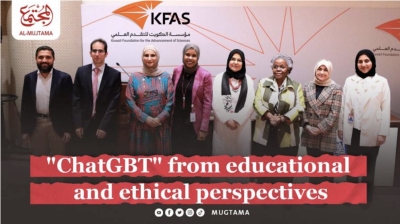The Kuwait Foundation for the Advancement of Sciences held a scientific event under the title "Chat GBT from the Perspective of Education and Ethics", through which it introduced the public, especially those interested in the subject, to the nature and importance of the topic, GBT Chat.
Dr. Muhammad Khajah, an associate researcher at the Kuwait Institute for Scientific Research (KISR), gave a lecture at the beginning of the conference in which he discussed the artificial intelligence revolution and how ChatGBT technology is one of its pioneering products. In order for our societies to stay up with this incredible technological advancement, Dr. Khajah highlighted that GPT chat technology, which refers to discussion or chatter utilizing pre-trained generative transformer technology, is still in the development stage.
Then Dr. Muhammad Khajah went over the techniques, advantages, limitations and disadvantages of GBT Chat and explained that one of the advantages of this technology or this robot is that it can access a huge amount of information in a short time and extract from it what the questioner needs and has the ability to analyze, but the researcher cannot attribute Something for GBT chat, i.e. it's not a source, so far at least. Khajah explained that what distinguishes ChatGBT from others is its superior and immediate ability to explain complex concepts in simple words, and to produce content from A to Z without direct quoting from other sources even though it is not connected to the Internet, although it has been fed with data available on the network.
Effects of CHAT GPT on educational assessments
The effects of chatGBT on educational assessments were the topic of a lecture by Dr. Fawzia Al-Awadi, assistant professor in the department of fundamentals of education at Kuwait University. Dr. Fawzia highlighted that social intelligence has huge benefits that will greatly alter the field of education. ChatGBT technology is distinctive in that it can reduce the time and effort required of humans to produce high-quality content and texts that address requirements or enquiries. However, one drawback of "ChatGPT" when it is used in the educational sector is that students may utilize it, thus procedures must be built to identify whether the text was written by a student or generated by a chatbot. This is because of its superior capacity to write material.
Considering the possibility that students will use ChatGBT technology to solve their homework, there are those who recommend that students write drafts of their research papers in their classrooms using browsers that monitor computer activity, and some universities are considering asking their students to explain all their references face to face.
One of the well-known drawbacks of this technology in the field of education is its ability to reproduce students’ answers, which will require a quick response from the educational sector through more expressive and positive ways of evaluating students based on derived concepts and away from recycling content.
Ethical perspectives on the use of ChatGPT
The next speaker was Dr. Hussein Al-Mahri, an associate professor in Kuwait University's department of computer science. Al-Mahri explained that since chatbot technology was introduced in 2018, artificial intelligence has altered both the world and users' perceptions of it, particularly because the information provided by them is often accurate and closely related to reality, just like you would receive from a real person. But, the system is still in its infancy, making it challenging for anyone attempting to deal with it ethically.
Yet, the danger resides in users' high trust in it because the main source that the program uses to receive and interpret data is the Internet, which is an open world with faulty information, and thus it may deliver incorrect information to users. Dr. Al-Mahri urged specialists in a variety of sectors, including law and ethics, to keep up with this massive knowledge-technological transformation.


